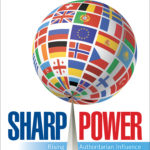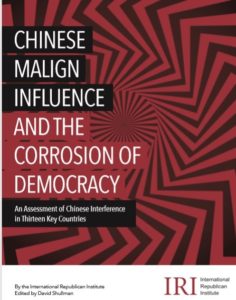Beijing’s response to Hong Kong’s pro-democracy protests demonstrates that far from enabling China’s peaceful reunification, the “one country, two systems” model is undermining it, argues Chin-Huat Wong, a professor of political science at the Jeffrey Sachs Center on Sustainable Development at Sunway University in Malaysia.
Perhaps this was inevitable, owing to a cause more fundamental than Xi’s centralization of power, the Communist Party of China’s increasing interference in Hong Kong’s affairs, or even the basic contradiction between a one-party regime and a multi-party democracy. The Chinese state, built on a millennia-old paradigm of political order, cannot cope with intergovernmental conflicts, he writes for Project Syndicate:
China now faces a dilemma. Unless democracy – with its requisite division – is shown to support the dream of civilizational resurgence, it will lack legitimacy among Chinese nationalists, he observes. But the only way to revive the “one country, two systems” rubric is to accept intra-governmental conflict – a great leap toward embracing democracy… But if China continues to suppress intra-governmental conflict, the collapse of the “one country, two systems” model will be only a matter of time.
 The ruling Communist Party’s greatest fear is Taiwan’s democracy, President Tsai Ing-wen said on Wednesday, Reuters reports. “The situation in Hong Kong makes it very clear to all of us that democracy and authoritarianism are in conflict. The two systems cannot coexist in one country,” she said.
The ruling Communist Party’s greatest fear is Taiwan’s democracy, President Tsai Ing-wen said on Wednesday, Reuters reports. “The situation in Hong Kong makes it very clear to all of us that democracy and authoritarianism are in conflict. The two systems cannot coexist in one country,” she said.
Referring to the anti-government protests in Chinese-ruled Hong Kong, Tsai said that Taiwan cannot accept “one country, two systems”, the method Beijing uses to rule the city which is meant to grant a high degree of autonomy and which China hopes eventually to apply to Taiwan.
“What China fears the most is Taiwan’s democracy,” said Tsai, who recently bestowed a major award on the National Endowment for Democracy’s Carl Gershman (above). “We must be aware that China is infiltrating and dividing Taiwan’s society in an all-round way.”
Council on Foreign Relations analyst Josh Kurlantzick provides a helpful update on Taiwan’s upcoming election in Taiwan’s Presidential Election: What to Know.
 In recent years party-controlled media have been trying to extend their influence abroad by buying up Chinese-language newspapers or reaching deals to provide them with news, The Economist notes. But vloggers such as Wen Zhao (above) are attracting huge audiences among overseas Chinese with commentary that does not follow the party line. They also appear to be penetrating the great firewall of China, as the country’s system of online censorship is often known.
In recent years party-controlled media have been trying to extend their influence abroad by buying up Chinese-language newspapers or reaching deals to provide them with news, The Economist notes. But vloggers such as Wen Zhao (above) are attracting huge audiences among overseas Chinese with commentary that does not follow the party line. They also appear to be penetrating the great firewall of China, as the country’s system of online censorship is often known.
In addition to eroding the role of the media, the CCP seeks to cultivate thought leaders throughout democratic societies, using seemingly innocuous “soft power”-type cultural and educational institutions to shape debate about China and advance its strategic interests. Coupled with pro-Chinese propaganda, such training helps bolster illiberal leaders’ authoritarian leanings, while in more democratic countries it undermines democratic norms and institutions, according to a new report from the bipartisan Democracy & Human Rights Working Group, convened by Arizona State University’s McCain Institute for International Leadership.
 It is not realistic to simply tell countries not to engage with China since that would be both hypocritical and economically unfeasible, but there has to be a healthy medium to working with the world’s second largest economy and most populous nation, notes the report, China’s Negative Influence Around the Globe, adding recommendations on how to help countries to change the terms of their engagement with China:
It is not realistic to simply tell countries not to engage with China since that would be both hypocritical and economically unfeasible, but there has to be a healthy medium to working with the world’s second largest economy and most populous nation, notes the report, China’s Negative Influence Around the Globe, adding recommendations on how to help countries to change the terms of their engagement with China:
- Taking a renewed and greater global leadership role by the United States to confront China’s negative human rights, economic and governance campaigns (what the NED characterizes as Beijing’s sharp power).
- Providing bipartisan support to new and innovative global economic initiatives such as the BUILD Act and the new U.S. Development Finance Corporation in order to help counter China’s Belt and Road Initiative’s global influence.
- Providing alternatives to Chinese financial investment, whether from the U.S. government, multinational development banks, or the private sector.
- Strengthening support for civil society, independent media, and democratic governance programs in countries that are particularly vulnerable to Chinese influence.
- Building awareness of China’s role and efforts to influence the narrative in the countries it is working in, especially in situations where an election might replace a China-friendly government, so that the new leadership will not fall into the same trap.
- Increasing global awareness of China’s negative influence beyond the governments, such as in the corporate and academic sectors.
Further details HERE.







